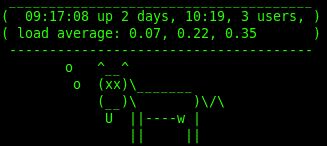Non-serious home server statistics :)

As a Friday post, let's teach a cow to talk :)
Using cowsay , we show the free space, the temperature of the screws and the processor, uptime.
In order to have fun, I decided to make a display of information about the home server in a playful way. All that happened we look under the cut.
A simple PHP script that can be viewed from anywhere through a browser deals with this kind of non-tricky information.
________________________________________________________________
(Filesystem Size Used Avail Use% Mounted on)
(/ dev / sda1 11G 1.9G 8.7G 18% /)
(tmpfs 253M 0 253M 0% / lib / init / rw)
(udev 10M 668K 9.4M 7% / dev)
(tmpfs 253M 0 253M 0% / dev / shm)
(/ dev / mapper / lvmvolume-arch)
(3.7T 3.7T 5.2G 100% / arch)
(/ dev / sda3 584G 579G 5.6G 100% /arch/.Downloading)
-------------------------------------------------- --------------
o ^ __ ^
o (oo) \ _______
(__) \) \ / \
|| ---- w |
|| ||
CPU 31 C Intel (R) Pentium (R) III CPU - S 1400MHz
/ dev / sda 24 C SAMSUNG HD642JJ
/ dev / sdb 31 C Hitachi HDT721010SLA360
/ dev / sdc 20 C SAMSUNG HD154UI
/ dev / sdd 26 C ST31500541AS
Linux server 2.6.26-2-686 # 1 SMP Wed Feb 10 08:59:21 UTC 2010 i686 GNU / Linux
uptime: 10:43:29 up 16 days, 16:59, 1 user, load average: 0.02, 0.04, 0.00 ')
Source code
<?php
// cowsay disk usage
system( "df -h | perl /usr/games/cowthink -n" );
echo "\n" ;
// CPU thermal info
$cpu_thrminfo = exec( 'cat /proc/acpi/thermal_zone/THRM/temperature' );
$cpu_thrminfo = explode( ':' , $cpu_thrminfo);
echo "CPU\t\t" , trim($cpu_thrminfo[1]);
// CPU model name
$cpu_mdl = exec( "cat /proc/cpuinfo | grep -i 'model name'" );
$cpu_mdl = explode( ':' , $cpu_mdl);
echo "\t" , trim($cpu_mdl[1]), "\n" ;
echo "\n" ;
// HDD temperature
$hdd_list = exec( 'nc localhost 7634' );
$hdd_list = trim($hdd_list, '|' );
foreach (explode( '||' , $hdd_list) as $hdd_temp)
{
$hdd_temp = explode( '|' , $hdd_temp);
echo $hdd_temp[0], "\t" , $hdd_temp[2], ' ' , $hdd_temp[3], "\t" , $hdd_temp[1], "\n" ;
}
// uname && uptime
echo "\n" , `uname -a`;
echo 'uptime:' , `uptime`;
?>
* This source code was highlighted with Source Code Highlighter .PS Work requires the running daemon hddtemp on port 7634.
Source: https://habr.com/ru/post/88126/
All Articles